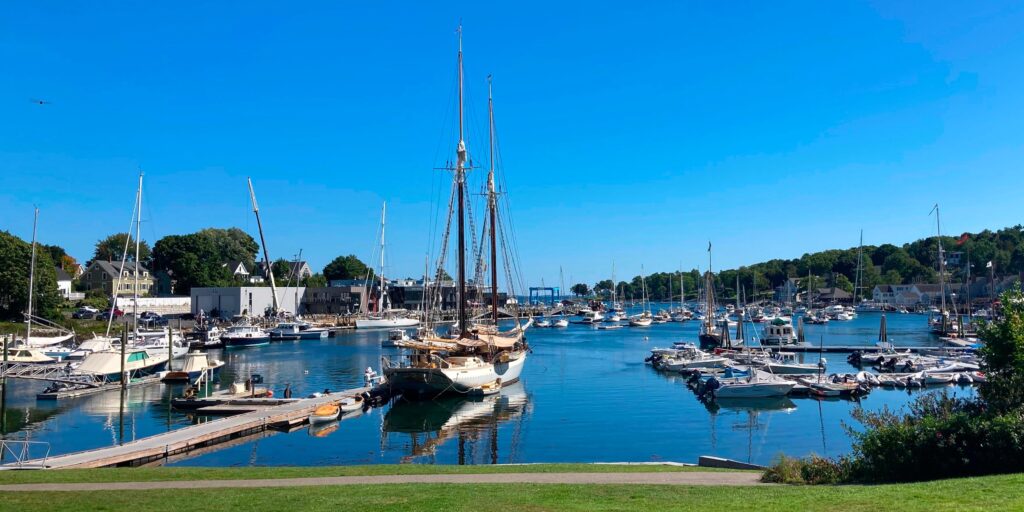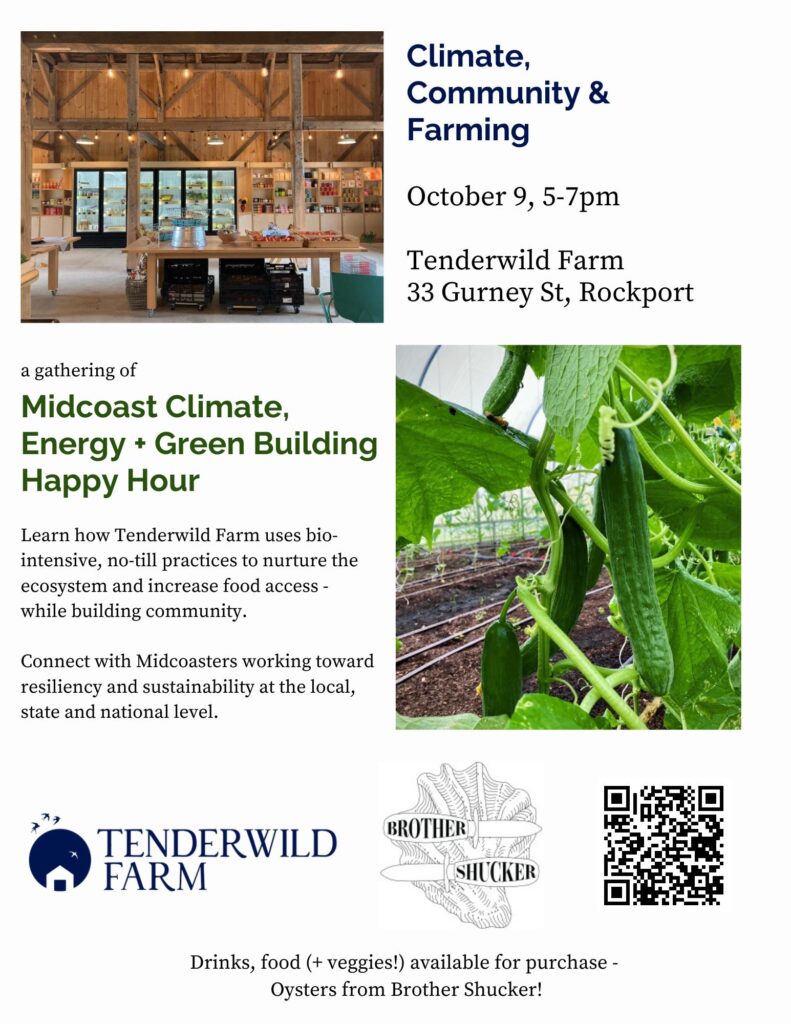Shifting Perspectives on Home and Climate Action
Sep 10, 2024

If you’re reading this, you most likely call Camden home, or you are closely connected to someone who does.
Regardless of your specific connection, you most likely call some place home.
Recently we’ve had the chance to return home to Camden. That’s a specific and particular privilege—we live in an exquisitely endowed place, where hard shore meets fluid sea, engineered trails snake up public mountains, clear brooks babble over 500-million-year-old rocks, and neighbors ask after your travels, holding your gaze, listening.
Yet “coming home” can be fraught. The emotions it illicits are broad, and not always pleasant.
Our summer travels moved us, not just physically, but internally. The foggy day doesn’t seem so wet or awful—at home there’s a place to get warm and dry, unlike on the boat. The blustery, northwest wind isn’t so intimidating anymore—our travels provided stronger stuff we found we could handle. And the curated, massive life with more house than needed, grocery stores with more breakfast cereal choices than there are passengers on a city bus? After the simplicities of life in nature—visiting small outports short on material goods, yet strong on spirit and care—the overabundance of goods smacks as way too much.
This summer’s travel brought home the stark realization that town life impacts millions—and not just humans. There is a cost to our single-family homes, our abundantly stocked grocery stores, the instant availability of goods, the “convenience” of an instant meal.
The world’s oceans, for years the world’s garbage dump, and the marine ecosystems previously supported there, are bearing the brunt of our lifestyle choices.
We were distraught to witness, firsthand, that the populations of sea birds, large ocean mammals, and all range of ocean life—in Nova Scotia and Newfoundland—have dropped precipitously in the last 15 years. Fellow sailors who had plied the same waters a decade ago reported the distinct lack of seabirds and mammals in recent years.
We exulted at the abundant seabird and ocean mammal populations in the environmental refuges of Witless Bay and Cape St. Mary’s (Newfoundland)—Witless hosts North America’s largest puffin colony, and St. Mary’s hosts over 30,000 Northern Gannets in their breeding season. But away from those areas, the ocean environment was remarkable stark. And lifeless. And warm.
Habitat loss, resource extermination, a rapid increase in ocean temperatures in the Gulf of St. Lawrence—and most importantly an increase in ocean plastics—all have impacted these formerly wild, wild coasts.
In Message In a Bottle: Ocean Dispatches from a Seabird Biologist, an elegant, first-hand account of these losses, causes, and potential solutions, Newfoundland native Holly Hogan shared this perspective gleaned in her ocean travels:
The ocean doesn’t feel. It doesn’t experience emotions or make judgments—it responds, impassively, to what comes its way. It simply follows the rules of nature—a change in temperature that will alter currents, increase storms, cause droughts. It will move nutrients, plankton, and microplastics equally; it will accept the plastic barrage until there is no more room. It will spray plastic in a fine mist, back to the coast. It will swallow a whale whole, or a ship. It will provide nourishment or habitat or it will poison food chains with toxins. The ocean will support life, but it doesn’t insist on it. The ocean doesn’t make choices. We do.
Our choices, our desire for consumer goods, and the fossil fuels that make them possible, greatly impact planetary systems like the ocean.
As Camden residents who welcome and invite the ocean as the centerpiece of our harbor town, we need to recognize that the world’s ocean health—and all it can support—is in our hands.
What I do here impacts those puffins and gannets struggling to nest on the shores of Atlantic Canada.
We choose how to travel in the world. We choose how much and what we consume. We choose the fuel that powers our homes, our vehicles. We choose single-use plastics. We choose fast fashion. We choose the convenience of hopping in the car for a quick errand. Or a jet trip. Or that cruise.
We each travel through life differently and arrive home differently, but hopefully we are more thoughtful about how we do that once we know our impacts. Astronaut Ron Garan summed up his post-travel perspective change in this powerful video, I Went to Space and I Discovered an Enormous Lie. When Garan gazed out the space station window and saw our blue planet,
I didn’t see an economy. But since our human-made systems treat everything, including the very life-support systems of our planet as a wholly-owned subsidiary of the global economy, it’s obvious from the vantage point of space that we’re living a lie. We need to move from thinking “economy, society, planet” to thinking “planet, society, economy.”
Garan encourages zooming out to the big picture, while simultaneously zooming in and keeping a close perspective on the small-scale, life-giving needs that sustain our planet. (Cinematographers will recognize this as the “dolly zoom”—watch the second part of the above video for Garan’s elegant description.)
We love that concept of zooming out while zooming in. Keeping both perspectives so that we don’t lose sight of our intricate interconnectedness. It’s both our blessing—the planet is a web of life, sustaining and sustained by all things—and our conundrum as humans: Everything we do is connected to everything else, so both our species’ intelligence and our species’ destructive tendencies are at play. Always.
It’s a challenging task to change our choices so that the planetary webs can survive.
We at CamdenCAN are celebrating being home, and excited to hear your perspectives.
To that end, this autumn CamdenCAN is hosting continued climate conversations, a tour of neighbors’ food gardens, and further Camden Talks Climate lectures as opportunities to broaden the enriching conversations that are part of Camden, our chosen home.
Upcoming CamdenCAN Events
9/12/24, Thursday, and 9/14/24, Saturday. Camden Households Food Garden Tour. Come learn how your neighbors are growing their own food, and meeting the challenges of the changing climate while doing so. There are small plots and large, and lots of folks willing and wanting to share knowledge, perhaps eventually seeds and seedlings. (We’ll work on a way of networking food gardeners after the event.) Read more about it here. If you’re interested in getting the list of gardens so you can take the tour, email beedyparker@gwi.net
9/18/24, Wednesday at 5 pm, and 9/19/24, Thursday at 1 pm. Camden Climate Conversation Circles held at the Camden Public Library. Do you have concerns about the changing climate, the impact of sea level rise, or the future of life on the planet? Come join an informal group where climate concerns, the warming planet, and global systems sustainability are all topics—conversation follows the groups’ interest, with trained facilitators to guide discussion if the going gets rough. See more here and here.
10/3/24, Thursday, at 6:30 pm, “Hurricanes in Midcoast Maine: Past, Present, and Future,” with Dr. Kerry Emanuel, emeritus professor of atmospheric science at MIT. Part of the Camden Talks Climate lecture series. Event will be in person and on video. Read more about it here.
10/15/24, Tuesday, at 6:30 pm, Peter Slovinsky, Maine State Geologist, on Sea Level Rise. Part of the Camden Talks Climate lecture series. (Slovinsky addressed the Camden Planning Board last spring. Listen here.)
Other Local Climate Events
9/24/24, Monday, 12 pm, Merryspring Nature Center, Camden, “Food Waste and Climate Change,” with Susan Lee, from the George Mitchell Sustainability Center. See more here.
10/9/24, Thursday, 5-7 pm, Tenderwild Farm, 33 Gurney St., Rockport. “Climate, Community, and Farming,” sponsored by Midcoast Climate, Energy, and Green Building Happy Hour. See the poster below.
Other Climate Issues and Topics
Camden Harbor Resilience Planning. Next month you’ll be hearing about open forums and sessions for residents to learn about sea level rise and provide input into how Camden tackles the issue. As mentioned in a previous newsletter, the town is currently working with Richardson Associates on this—the grant’s aim is to help us think forward about the implications of the warming planet—principally sea level rise—on our harbor, and create agreed upon plans for the public spaces as well as resources for private harbor property owners to both get educated on sustainable options and perhaps begin to create their own resilience plans.
Civic Sunlight, Town Government Synopses. There’s a new, free service available that delivers summaries of Camden select board meetings—and other gatherings of municipal importance—into your inbox. (We’ve heard it’s using AI technology, but don’t know much about that.) We’re all for anything that keeps us informed and engaged. Have look and sign up here.
Two-town Wastewater Conversations and Collaboration. There’s a combined Rockport-Camden select board workshop on this issue on September 24 at 5 pm. Why is this a climate issue? The higher rainfalls—a result of our warming planet—are causing I & I (infiltration and inundation) issues, stressing local waste treatment systems. We have opportunities to solve the problem together.
Solar Shines. Solar is at its lowest cost ever. If you’ve not yet signed up to be part of a community solar farm, or investigated taking charge of your own solar generation, it’s time. Need help understanding options? We have the names of local folks who have knowledge and aren’t trying to sell you something. Email and we’ll hook you up. Or listen to this event we hosted last spring. Going forward we’d like to create a network of energy experts for Camden residents. And we’ll be asking, yet again, for the Town of Camden to invest in the solar farm we are now leasing. More about that in coming issues.
Climate Tidbits From Farther Afield
New climate book. Many of you joined in the local reading circles where we talked about the book All We Can Save by Ayana Johnson and Katherine Wilkinson. Johnson now has a new book out called What if We Get It Right? Visions of Climate Futures. Local retailer Symmetree will host the author soon. In the meantime, you can read the author’s new substack on the topic. We think you’ll find it worth the time.
Updates to Maine’s Climate Plan—Maine Won’t Wait. The state will release its updated climate plan this December. In the lead-up to that they are holding meetings about the state. You can listen to last week’s virtual public meeting for the Maine Climate Council here.
Concluding Thoughts
Camden residents are fortunate. We have ample fresh water, we haven’t yet experienced too much heat (yet we are losing our winters), and forest fires haven’t impacted us in decades. All this appeals to folks fleeing climate-induced troubles—be it excessive heat, fires, repeated floods, lack of water, or loss of livelihood.
If it’s so good living in Maine now, why should we take action?
Because what you bring into your home, how it gets there, where it comes from, what it’s made of, and what happens to it at its “end-of-life” all has an impact on puffins breeding off the coast of Newfoundland and the gannets skimming over Atlantic swells. The ocean doesn’t make choices. We do.
Chose to make the entire planet your home. Chose to support non-human webs by reducing your impact. Chose to make changes that reduce atmospheric warming and resource depletion around the world.
(And yes, it’s also up to us to create the initiatives and policies for long-term infrastructure changes. More to come on that, too.)

